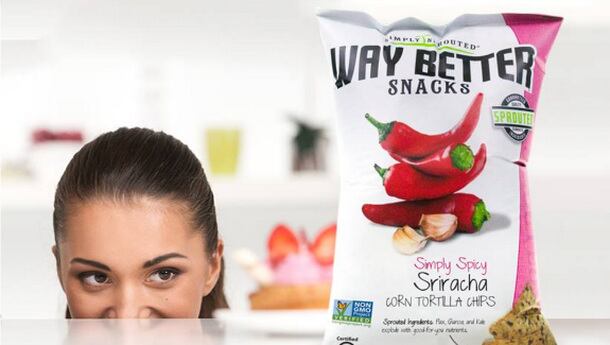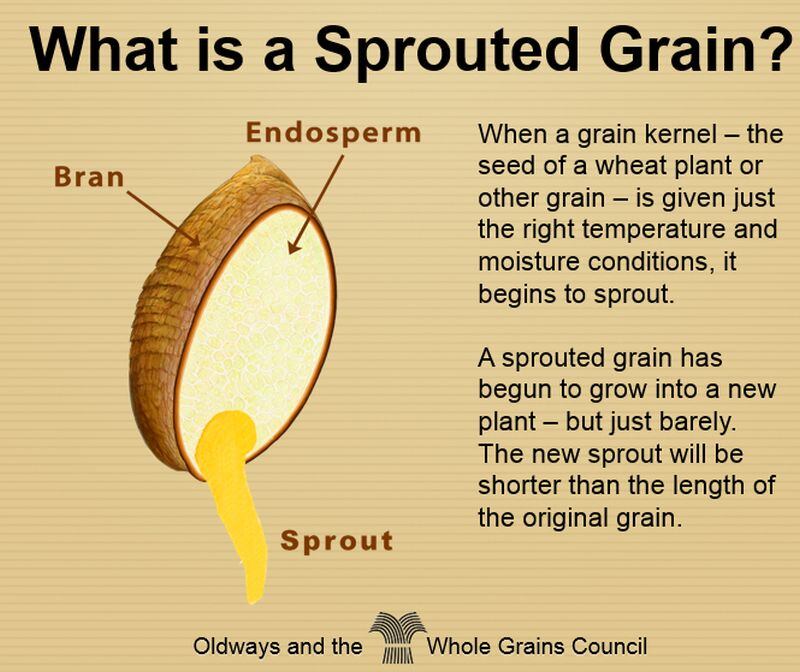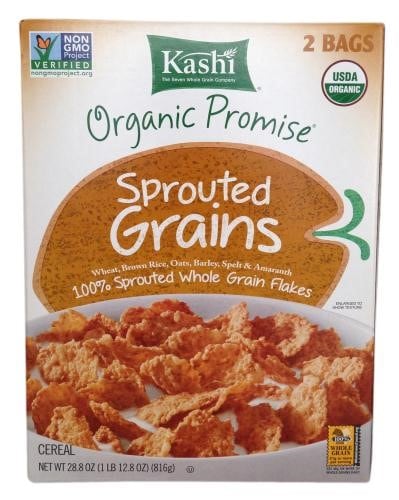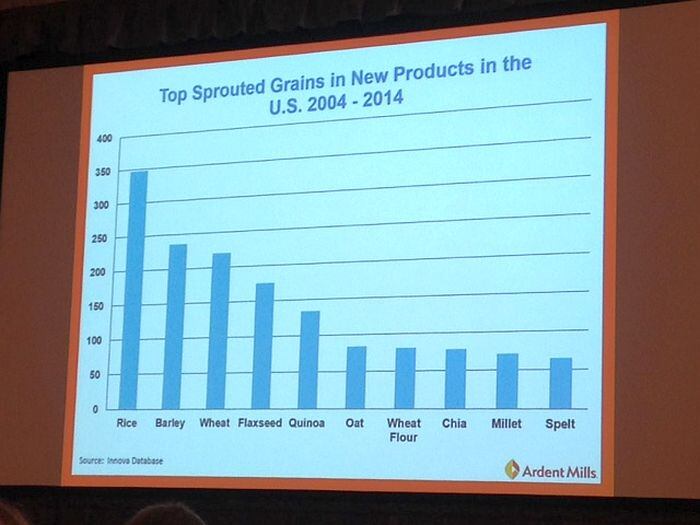Sprouted grains have started to germinate, and consumers instinctively buy into the notion that this is a good thing, even if they don’t know why, Datamonitor Consumer innovation insights director Tom Vierhile told FoodNavigator-USA.
Indeed, Datamonitor Consumer’s 2015 ingredient survey found consumers rated sprouted grains more highly than kale, ancient grains, Greek yogurt and coconut oil – placing them at #14 out of 100 healthful ingredients, “with 70% of consumers globally [and 68% of US consumers] saying they thought sprouted grains/seeds would have a positive impact on health," said Vierhile.
A healthy halo?
He added: “What is kind of remarkable about this is that most products made with sprouted grains do not really make any explicit health claims about what health benefits sprouting can provide [which range from improved digestibility to higher nutrient levels and improved flavor].
“I don’t think consumers really understand the benefits behind sprouted grains, but they do seem to regard them as sort of a ‘halo’ ingredient that may be better for them, or at least evidence that a product containing them is less processed.”
And while US retail sales of branded products making sprouted grain claims are fairly modest (around $100m* in 2014, $75m of which was from branded breads), sales have been growing at an average annual rate of +13% since 2011, Dr David Sheluga, consumer insights director at grains giant Ardent Mills, told FoodNavigator-USA.
Sprouted grains have "long term potential to be very big” for three reasons, said Dr Sheluga:

- "First, they have several health and nutrition benefits, some of which can help to offset the criticism of grains.
- Second, they can attach to beauty, diet and fitness trends by virtue of delivering more complete protein and lower acidity.
- Third, and I believe most importantly, sprouted grains play into a deep emotional need for new beginnings, rebirth, and renewal… Sprouting, with its connected imagery to water, earth, sun and sky, projects positive images of new beginnings. Even those who know nothing about sprouting, will conjure up images of water, sun, earth and new green sprouts in their imagination. The promise of fresh beginnings is very powerful.”
Sprouted grains do have some momentum in the new product marketplace
As for new launches, Datamonitor Consumer’s Product Launch Analytics data reveals a sharp upward trend, albeit from a very low base, said Vierhile:

“0.3% of new food launches in the US in 2012 had sprouted ingredients. That figure rose to 0.4% in 2013. But by 2014, the percentage more than doubled to 1%.
“This is definitely not a huge percentage, but it does indicate that sprouted grains do have some momentum in the new product marketplace right now.”
What are sprouted whole grains?
"Malted or sprouted grains containing all of the original bran, germ, and endosperm shall be considered whole grains as long as sprout growth does not exceed kernel length and nutrient values have not diminished. These grains should be labeled as malted or sprouted whole grain." AACCI, 2008
Is there an internet buzz around sprouted grains?
On the flip side, noted Dr Sheluga, there isn’t a huge internet buzz around sprouted grains, at least not yet, although when you ask consumers about them, they are very enthusiastic.

“What’s unusual is that the initial excitement is starting among ingredient suppliers and product manufacturers ahead of consumers and influencers. If you examine consumer online search interest in the topic of ‘sprouting’ or ‘sprouted grains’, you'd find it is on par with search interest in pink Himalayan salt. Meaning - very few consumers are trying to learn about sprouted.”
Selling sprouted grains: My advice to product developers is to not focus solely on nutrition
Looking ahead, predicted Vierhile at Datamonitor: “The trend toward sprouted grains and seeds is in an expansion phase, and I would expect it to keep on growing – especially with some larger brands like Kashi now jumping on the bandwagon.
“Consumers are curious about what all of the fuss is about, and that should keep things moving in an upward direction for a while. Whether or not that growth is sustainable is going to rest partly on proof that sprouting actually does deliver enhanced health benefits.”
From a marketing perspective, however, nutrition is not necessarily the primary driver behind interest in sprouted grains, cautioned Dr Sheluga: “My advice to product developers is to not focus solely on nutrition. If they do, they will limit the potential of sprouted grains.
Improved baking performance
According to Ardent Mills, sprouted whole wheat flour delivers superior loaf volume, proof times and dough stability, while bread baked with the flour is sweeter and less bitter.
“Instead, focus on messaging that stirs these deeper emotional needs. It's no coincidence that Food for Life and their Ezekial 4:9 bread are the most successful in sprouted grains products so far.”
According to data presented by Ardent Mills at the 2015 Whole Grains Summit in Portland, OR last week, the top food categories for sprouted grains are bread & bread products, followed by cereal and energy bars, nutritional powders, breakfast cereals and snacks.
What are sprouted grains?
Sprouted grains have been allowed to germinate (sprout) in a controlled manner by exposing them to moisture. This process is then typically halted by drying the grains at just the right time (after beneficial enzymes have been activated to work their magic, but before the grains are ‘drowned’), although some firms mash wet, sprouted grains into a purée that is sold frozen.

However, while the AACCI’s definition (see box above) is often cited by industry, there is no regulated definition of ‘sprouted grains’ and no agreed protocols over when the germination process should be halted**, or what label claims (which nutrients are increased, by how much?) firms can make.
Technical, sensory and nutritional benefits
While sprouted grains offer functional benefits for bakers (improved baking performance, better volume and stability, and reduced proofing time), they also promise consumer benefits from improved digestibility to higher nutrient levels and improved flavor.
Tests also show that the bio-availability of some nutrients is also higher in sprouted grains because the sprouting process activates enzymes that eliminate or reduce components such as phytic acid which are designed to lock in nutrients and stop the seed germinating before it’s planted.
According to the Whole Grains Council (click HERE), sprouting grains can cause many changes including:
- Complex molecules become simpler and easier to digest
- Minerals such as iron, calcium, manganese, become more bioaccessible
- Vitamin C, folate, and antioxidants can increase [ORAC scores of sprouted seeds are higher]
- Insoluble fiber decreases; soluble fiber increases
- Gluten decreases

*Source: Nielsen Scantrack, total US, XAOC (food, drug, mass merchandise, Walmart, club stores, dollar stores, military stores (excludes Whole Foods, Trader Joe’s, Costco, c-stores, some dollar store chains).
**Some firms use the ‘falling number test’, which measures the alpha-amylase enzyme activity in grains, to determine the appropriate point at which to halt the sprouting process.
